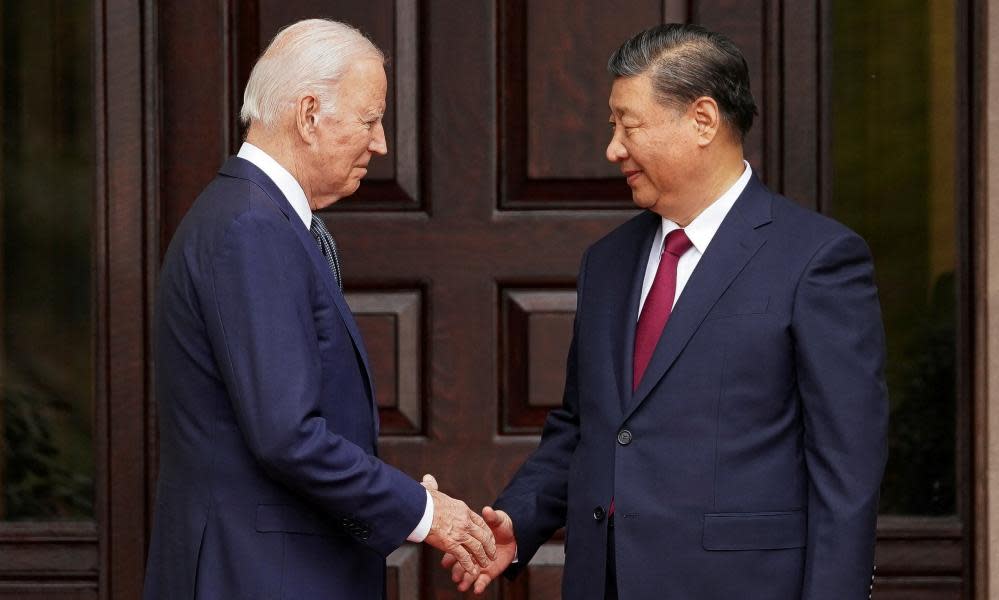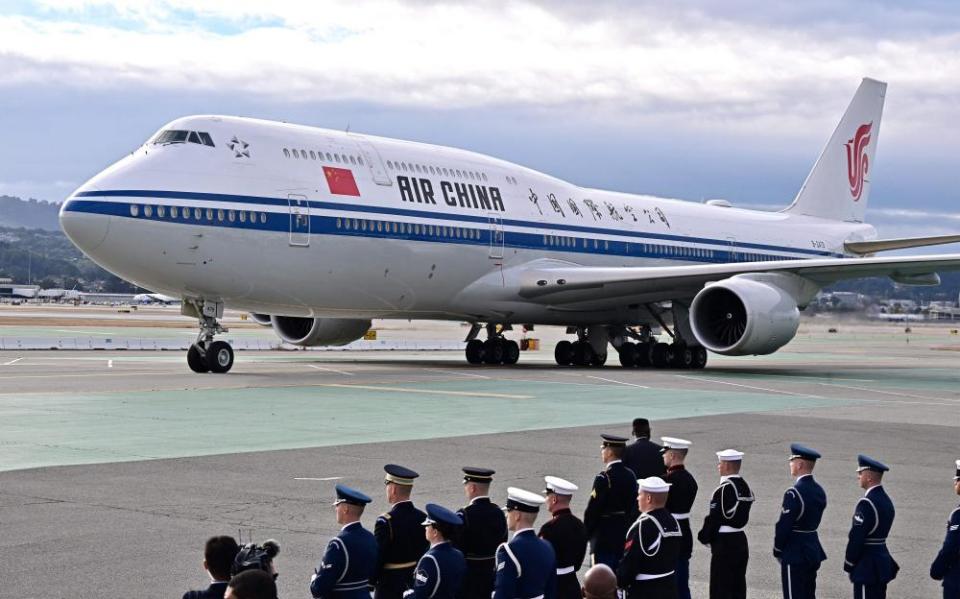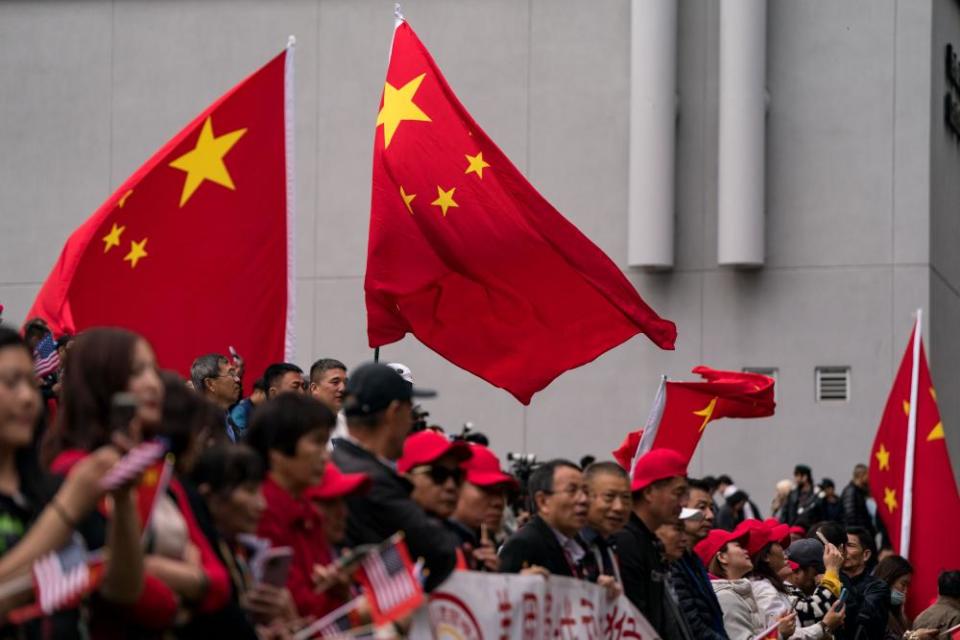‘Planet Earth is big enough for two’: Biden and Xi meet for first time in a year

Joe Biden and Xi Jinping met in California on Wednesday, exchanging handshakes and smiles as they embarked on face-to-face dialogues that both sides hope will stabilise US-China relations.
The US president opened his remarks by saying that tensions between the two countries should “not veer into conflict”.
The Chinese president responded by saying that “turning their back on each other is not an option” for the superpowers. “Planet Earth is big enough for the two countries to succeed, and one country’s success is an opportunity for the other,” he said.
Xi called the US-China relationship “the most important bilateral relationship in the world”, and said he and Biden “shoulder heavy responsibilities for the two peoples, for the world, and for history”.
“For two large countries like China and the United States, turning their back on each other is not an option,” he said. “It is unrealistic for one side to remodel the other, and conflict and confrontation has unbearable consequences for both sides.”
The White House later described the meeting as “candid and constructive”, adding that the two leaders had discussed “a range of bilateral and global issues and exchanged views on areas of difference”.
The meeting was the first time that the two leaders have been face to face in a year. It came just after the two countries released a joint climate statement, with more agreements expected in the coming days at the Asia-Pacific Economic Cooperation (Apec) forum in San Francisco.
Xi and Biden met the day after their countries pledged to work together more closely to fight global heating, declaring the climate crisis “one of the greatest challenges of our time”.
Related: China and US pledge to fight climate crisis ahead of Xi-Biden summit
The announcement further fuels hopes that the two nations can mend relations after years of turmoil over issues including trade, human rights and the future of Taiwan.
In a joint statement after climate talks in the US, they pledged to make a success of a crucial UN climate summit starting at the end of this month in Dubai and recommitted to the 2015 Paris climate accord goals of holding global heating to “well below” 2C, while pursuing efforts to limit the increase to 1.5C.
“The United States and China recognise that the climate crisis has increasingly affected countries around the world,” the statement said. “They will work together … to rise up to one of the greatest challenges of our time for present and future generations of humankind.”
Xi and Biden’s summit has been billed by US officials as an opportunity to reduce friction in what many see as the world’s most dangerous rivalry.
It comes on the back of a series of agreements aimed at setting a floor for the relationship. In addition to the climate agreement that was published on Tuesday, Beijing and Washington are expected to reach a deal on controlling the flow of fentanyl from China to the US.
The US is also hoping to reopen military dialogues, which have largely been frozen since the visit of Nancy Pelosi, the then speaker of the House of Representatives, to Taiwan last year.
With elections in Taipei in January expected to strain cross-strait relations, Taiwan will also be high on the agenda for the Xi-Biden talks. Beijing is keen to challenge what it sees as a worrying shift in the Biden administration towards more support for the self-governing island, which China claims as part of its territory.
In advance of the summit, Chinese state media have adopted a warmer tone towards the US. The official Communist party newspaper, the People’s Daily, said in its overseas edition: “The Chinese people will never forget an old friend, and that’s an important message we want to send to the American people.” The often confrontational Global Times newspaper called for the two countries to cooperate.

One of the most notable features in the climate statement was that both countries would commit to “economy-wide” nationally determined contributions (NDCs) across all greenhouse gases, not just CO2. China has previously resisted the idea of specifying which parts of the economy would be covered by its climate pledges.
Li Shuo, the incoming director of the China Climate Hub at the Asia Society Policy Institute, said the language of “economy-wide” NDCs “implies a pretty stringent framework” that “will help enhance the transparency of China’s emissions”, a goal that the US has long pushed for.
The US and Chinese climate envoys, John Kerry and Xie Zhenhua, met this month at the Sunnylands resort in California in an attempt to restart stalled cooperation. Experts agree that keeping the Paris goals in reach will require an enormous collective effort to reduce greenhouse gas emissions this decade.
Xi arrived in the US for his first visit in six years on Tuesday and waved from atop a passenger staircase attached to his Air China plane before descending to meet US officials waiting on the San Francisco tarmac, including the treasury secretary, Janet Yellen, and the US ambassador to China, Nicholas Burns.
He then got into his Chinese Hongqi, or red flag, limousine and departed the airport for the city, where demonstrations are expected both supporting and protesting against his visit.
Biden has said his goal in his talks with Xi will be to improve the relationship with China after a period of strained ties. He said he would seek to resume normal communications between the two superpowers, including military-to-military contacts. The White House national security spokesperson, John Kirby, told reporters that Biden and Xi would also talk about the Israel-Hamas conflict in Gaza as well as US efforts to support Ukraine.
Related:Biden and Xi to announce deal cracking down on fentanyl export
Speaking in the hours before Xi’s arrival, the US secretary of state, Antony Blinken, addressed ministers of the 21-member Apec and stressed that the US believed in “a region where economies are free to choose their own path … where goods, ideas, people flow lawfully and freely”.
Blinken did not mention China in his remarks, but his language echoed US rhetoric in recent years in which Washington has accused Beijing of bullying smaller countries in the Indo-Pacific region and trying to undermine what the US and its allies call the existing “rules-based” order.

The US trade representative, Katherine Tai, who with Blinken opened the Apec ministerial session, said the San Francisco meeting came at a time of “great uncertainty and challenges” for the region. She noted increasing geopolitical tensions, fragile supply chains and a worsening climate crisis.
Biden said the US did not want to decouple from China but wanted to change the economic relationship for the better. His administration has made a push to “de-risk” some critical US supply chains from China as the two countries’ economic and military competition has grown.
But it has been careful to assure countries in the region, including China, that the US does not seek complete economic separation, a notion that has fuelled concerns among Washington’s partners and allies of a superpower showdown that would upend the global economy.
Several hundred mostly pro-China demonstrators carrying Chinese flags gathered outside the Chinese delegation’s hotel before Xi’s arrival in the US. In recent weeks Chinese diaspora associations and the alumni networks of Chinese universities have been recruiting members to welcome Xi’s visit.
Larger protests, including by rights groups critical of Xi’s policies in Tibet and Hong Kong and toward Muslim Uyghurs, are expected to gather near the summit venue on Wednesday.
Reuters and Agence France-Presse contributed reporting

 Yahoo News
Yahoo News 
